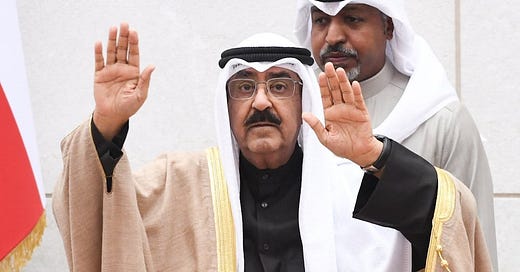Kuwaiti Emir Suspends Constitution and Dissolves Parliament
A Political Crisis Or A Necessary Act To Save A Nation?
In a decisive response to escalating political unrest, Kuwait’s Emir Sheikh Mishal Al-Ahmad has suspended key constitutional articles and dissolved the parliament, consolidating power amidst a deepening governance crisis. The measures signal a pivotal shift in the political landscape of this oil-rich Gulf state, historically known for its active parliamentary system.
Background of Political Tensions
Kuwait has often been seen as a beacon of parliamentary democracy in the Gulf region, with its National Assembly wielding significant legislative power. However, frequent clashes between the elected body and the government have led to multiple dissolutions of parliament in past years. The current actions by the Emir are viewed as an unprecedented escalation in these ongoing power struggles.
The Emir’s Decree
The Emir expressed his concerns over what he described as the exploitation of democracy to undermine the state’s stability. “The political scene has reached a stage that cannot be tolerated,” Sheikh Mishal stated, emphasizing the need for stability and accusing the National Assembly of overstepping its bounds, particularly in the matters of government appointments and anti-corruption measures. The Emir also lamented the pervasive corruption that he claimed had infiltrated all levels of state institutions, including security and judicial bodies.
In his speech, the Emir announced the suspension of certain constitutional articles for a period not exceeding four years and the dissolution of the parliament. During this period, all legislative powers are transferred to the Emir and his appointed Council of Ministers.
Implications for Governance
These steps taken by the Emir have effectively paused Kuwait’s democratic process, raising concerns about the future of governance and human rights in the country. Critics from within Kuwait and international observers have warned that such consolidation of power might lead to increased instability and erosion of civil liberties.
Legal experts argue that the suspension of the constitution—even temporarily—sets a dangerous precedent for governance. “It’s a significant setback for democracy in Kuwait,” noted a Kuwaiti constitutional lawyer, who preferred to remain anonymous due to the sensitivity of the situation.
Reactions
The international community has not yet reacted to this breaking news. However, caution about the recent developments is expected to be the order of the day. It is a strong possibility that, like in similar cases in the MENA region, human rights organizations may urge the Kuwaiti leadership to ensure that any measures taken do not violate international human rights standards, and local political actors may call for dialogue and peaceful resolution to the political crisis while emphasizing the importance of maintaining democratic institutions.
It will be interesting to see how internal reactions to the news in Kueait will take shape, as it is important to note that the Emir of Kuwait is much respected in his country and has had a longstanding reputation prior to being Emir of always “Putting Kuwait and its people first” as one observer put it.
Final Thoughts…
As Kuwait navigates this unprecedented political turmoil, the global community watches closely. The challenge for Sheikh Mishal’s regime lies in balancing the need for stability with the preservation of democratic integrity. How Kuwait addresses these challenges will significantly impact not only its own future but also that of the broader Middle Eastern region, where political stability is often in a delicate balance.






